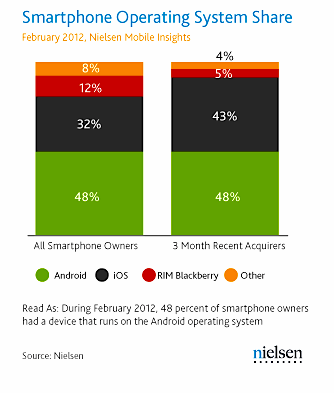iPhone is unstoppable

Now there's a headline I never expected to write, particularly following "Android is unstoppable" nine months ago. But in the United States, at least, iPhone has nearly matched pace with Androids. Looks like the Apple apologists will get their day. After years of wrongly boasting iPhone's leadership over Androids, they might yet be right.
For the three months ending in February, 48 percent of Americans who recently bought a smartphone, chose Android -- 43 percent iPhone, according to Nielsen. Those numbers are up considerably for both, but iPhone surged to close the gap, following the release of the 4S in October. A year ago, 27 percent of new acquirers chose Android versus 10 percent for iPhone.
The Gain Drain
Android's overall market share is still considerably greater than iPhone's -- 48 percent to 32 percent, respectively. That's up from 38 percent for Android, 27 percent for iPhone nine months ago, by Nielsen's reckoning.
comScore reports similar share, but for end of January -- 48.6 percent for Androids and 29.5 percent iPhone, based on smartphone operating systems among US cellular subscribers.
Neilsen's findings join others. In February, Pew Internet asked American adults what kind of smartphone they own. Twenty percent responded "Android device", up from 15 percent in May 2011. iPhone: 19 percent, up from 10 percent during the same time period.
Pew puts the number of American adults with smartphones at 53 percent. Nielsen says 49.7 percent -- that's up from 36 percent in February 2011. Either way, smartphone sales soar, as the market rapidly consolidates around Androids and iPhone.
The China Syndrome
With the 4S launch, iPhone benefits from broader US distribution -- three of the four major carriers and regional ones, too. Additionally, Apple and its partners lowered the price to zero for the older iPhone 3GS and $99 for the 4, opening up the market to consumers who could't or wouldn't spend $199 or more.
iPhone's gains here may not be sustainable abroad. "Smartphone growth will be driven by Asia/Pacific countries, especially China, where mobile operators are subsidizing the purchase of 3G smartphones, thus increasing the total addressable market", Will Stofega, IDC program director, says. The analyst firm expect low-cost Androids to be market leaders. "In countries where devices are not subsidized by the mobile operators, competitive and component-based pricing will help drive volume".
CEO Tim Cook has repeatedly called China Apple's second most-important market, next to the United States. Perhaps this importance has something to do with his visit there this week.
 Bold Predictions
Bold Predictions
IDC isn't exactly bullish about iPhone's future, particularly as smartphone adoption increases internationally, predicting that Windows Phone would beat out Apple's iOS by 2015. Two weeks ago, IDC made similar prediction about tablets: Android shipments will exceed iPad, also by 2015. By that reckoning, the firm predicts that Google's mobile OS will dominate the two major cloud-connected -- post-PC, if you insist -- device categories.
But I predict that Apple will win the mobile platform wars. Perhaps IDC tacitly agrees.
"Android's growth is tied directly to the propagation of lower-priced devices," Tom Mainelli, IDC research director, says. "So, while we expect dozens of hardware vendors to own some share in the Android market, many will find profitability difficult to sustain".
Show Me the Money
In platforms, profitability is everything. Typically, successful platforms share six common traits:
- There are good development tools and APIs for easily creating applications
- There is at least one killer application people really want
- There is breadth of useful applications
- Third parties make lots of money
- The platform is broadly available
- There is a robust ecosystem
But profitability matters most. Developers go where the money is.
IDC now lumps together PCs, smartphones and media tablets into the "smart connected devices segment". Among them, the firm sees Androids reaching 31.1 percent share in 2016, compared to 17.3 percent for iOS devices.
However, "we expect a large percentage of application developers to continue to focus their efforts on iOS, despite the platform's smaller overall market share, because iOS end users have proven more willing to pay for high-quality apps", Mainelli says.
Developers go where the money is. End users go where the apps are. Developers create apps where users are. iPhone 4S isn't an exceptional upgrade compared to its predecessor. There's no LTE, for example. Siri is interesting, for sure. But they're not compelling enough to explain iPhone's recent sales surge.
It is the broader ecosystem -- of apps, cases and peripherals -- that matters more. In the 1990s, Microsoft sought to achieve a "standard" platform for developers and succeeded with Windows. Apple is quickly doing the same around iOS, iPhone and iPad.
iPhone is unstoppable because the broader iOS ecosystem has such momentum -- and there iPad hugely matters. I don't believe iPhone can win the smartphone wars. But does it matter if iOS apps and devices win the platform wars?
